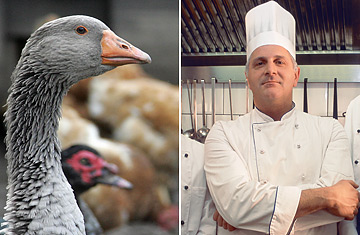
At Philadelphia's Vintage restaurant last week the special was two delicately pan-seared pieces of foie gras perched atop toasted brioche with a berry coulis, garnished with fresh raspberries and a side of rebellion.
The days of foie gras as a simple exercise in gastronomic luxury are over. Foie gras — French for the fatted liver of a duck or goose —has come under increasing fire in the U.S., where it is a $17 million business. Chicago has banned the sale of it and California law will make it illegal to sell or raise foie gras by 2012. The fiercest battleground right now is in Philadelphia, where City Councilman Jack Kelly has proposed a ban and animal rights group Hugs for Puppies has been demonstrating outside the homes and businesses of chefs who serve the delicacy. But now a group of Philly restaurateurs are fighting back, under the banner Philadelphia Chefs for Choice, marking the first time anywhere that chefs have organized to protest the foie gras protesters. During the first week of October, nearly 20 restaurants served foie gras specials on their lunch and dinner menus for just $5. The chef group has stated: "In the city of Philadelphia, the birthplace of American liberty, we want to keep the right to serve foie gras."
The debate is centered on the practice of gavage, in which corn is force-fed to farm-raised ducks through a funnel down their throats. Some argue that gavage is inhumane, while others counter that the physiology of a duck is not the same as a human. "It seems terrible if you don't know that a duck's esophagus is lined with a very thick cuticle, if you don't realize that baby ducks are fed by their mother pushing her beak down the baby's throat," says Ariane Daguin, owner of D'Artagnan, the largest foie gras purveyor in the U.S. Recent studies by Dr. Daniel Guémené, a leading expert on the physiological effects of gavage, have shown that ducks with young in the wild were under more stress than the ducks being fed through gavage. And both The American Veterinary Medical Association's House of Delegates and the American Association of Avian Pathologists have concluded that foie is not a product of animal cruelty.
Animal rights activists remain unconvinced and have been increasingly organized in their efforts to have foie gras banned. Hugs For Puppies, which began as an informal vegetarian outreach and animal rescue group in Philadelphia in 2002, started approaching restaurants a few years ago and occasionally protesting, says founder Nick Cooney. "Last December [restaurateur] Stephen Starr stopped serving foie gras and it really motivated us to keep going. Now we are out protesting every week."
Starr, who owns a dozen Philadelphia hotspots, insists that the activists had little to do with his decision to remove foie gras from all of his Philadelphia restaurants. "If they said, 'Can we meet with you?' I probably would have, but instead they use the bullhorn, these really creepy tactics. The bottom line is," he adds, "that it's probably not a good thing to do to the animals. But honestly to me it was a non-issue. It didn't sell that well, I don't like to eat it myself."
But having taken credit for a victory, the Hugs for Puppies group has moved onto other restaurants, picketing the businesses and homes of chefs like David Ansill who recently removed foie gras from his menu at his restaurant Ansill after protesters hounded his customers and staff and leafleted his neighborhood for months. "When I talked to him he hadn't slept in 15 days," says foie gras distributor Daguin. "The acts of the protesters are nearly terroristic," she says. Said Ansill wearily: "It wasn't worth it. I caved."
Cooney claims that his group represents the public majority, citing a survey which says that 85% of Pennsylvanians are anti-foie gras. "It's not just a matter of preference on a menu like chocolate or vanilla. It's a matter of protecting animals."
But as celebrity chef/author Anthony Bourdain has argued, how can any meat product be cruelty-free if you are killing an animal? To some chefs the anti-foie gras movement feels like the first step towards demands for completely meat-free menus. Chef Parind Vora, whose Austin, Tex., restaurant Jezebel has been subjected to twice weekly protests by a group called Central Texas Animal Defense, believes that animal rights activists are targeting foie gras because it's a small industry with little resources to fight back. It's also food often associated with the upper crust, allowing the class issues to color the debate.
But in Philadelphia last week, foie was the food of the people. At Caribou Cafe, the sliders came topped with caramelized onions and a piece of pan-seared foie gras. At Zinc, the foie came poached with mango chutney and waffle chips. Diners wearing bold red "We Love Foie Gras" T-Shirts embarked on foie-cathalons.
"I could care less about those snobby French chefs," Councilman Kelly said in response to the counter-protests. "They can stick their $5 foie gras up their rears." Yet as the week ended, the restaurateurs were planning their next steps. Michael and Terry McNally of the London Grill are planning an Oct. 22 dinner in honor of Hudson Valley Foie Gras co-founder Michael Ginor and his book Foie Gras: A Passion. For a $165 prix fixe, the six-course dinner will include foie gras in every course, from the matzo ball soup to a creme brulee dessert.
